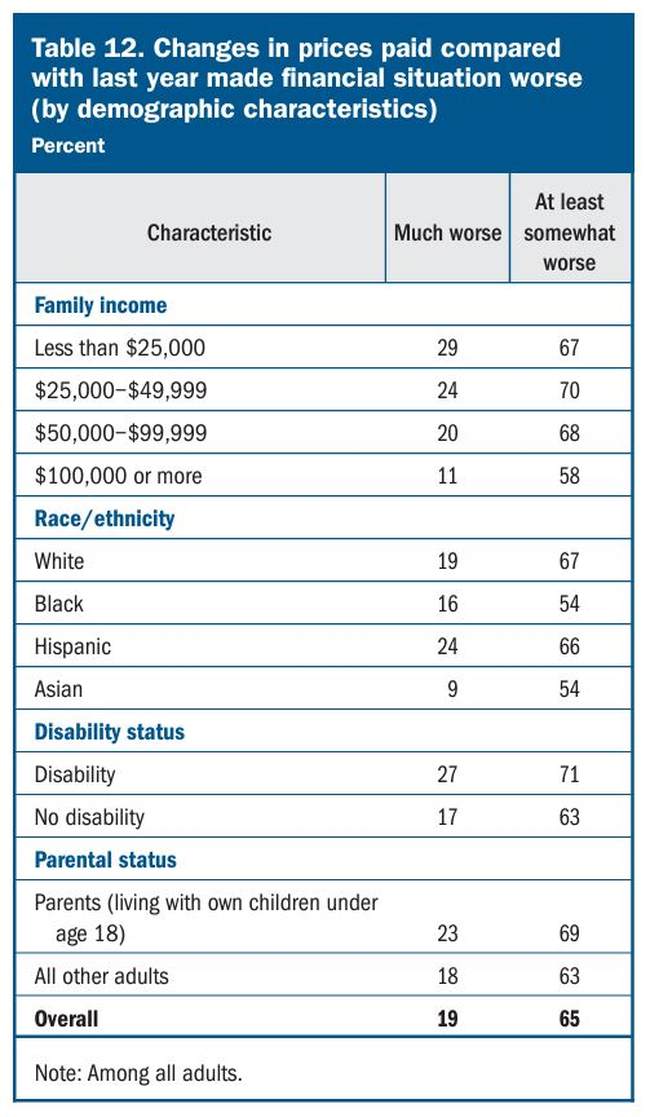The Fed released a report today showing that a majority of Americans said they were still being impacted by inflation last year. In some cases that meant not being able to pay bills or buy food.
Inflation may have slowed last year, but it continued to deal heavy blows — some devastating — on Americans’ livelihoods: Nearly two-thirds of US adults were worse off because of it, and roughly 1 in 6 couldn’t pay all their monthly bills, new Federal Reserve data shows...
Inflation made the financial lives “worse” for 65% of US households, according to the report. Among those, 19% said it was “much worse.”...
Incomes grew healthily in 2023, but so did spending, the Fed report showed. Monthly budgets remained tight and more than half of adults didn’t have money left over after paying their expenses.
This was especially true for lower-income adults, who reported higher instances of not having enough to eat, not being able to cover bills in full and skipping medical care.
Here's the full report. Respondents were asked an open-ended question about their financial challenges and the top response was about inflation.
Inflation was the most common challenge, with more than one-third classified into that category, followed by basic living expenses and housing (figure 6)...
When describing challenges related to inflation, many people mentioned the cost of food and groceries. For example, one respondent stated that “[the] increase in cost of food has significantly impacted [my] budget.” Another said, “…rising food prices hurt daily.” Those with incomes under $100,000 were more likely to specifically mention the cost of food and groceries as a concern.
People also expressed concerns about housing affordability. For example, one respondent said, “rent costs keep rising and it is hard to save enough for a down payment to buy a house.”
Asked about their incomes in 2023, many respondents said it had gone up, but there was a catch. Their expenses had gone up too.
A sizeable share of adults said their family’s monthly income increased in 2023 compared with a year earlier. However, the share of adults who said their spending increased from the prior year was even greater...
Thirty-four percent of adults said their family’s monthly income increased in 2023, while a higher 38 percent increased their monthly spending (figure 9).
Overall, 51% of adults said they were spending equal to or more than their monthly income. And this brings us to the question about expenses that was headlined by CNN.
Most adults said that price increases made their financial situation worse. Sixty-five percent of adults said that changes in the prices they paid compared with the prior year had made their financial situation worse, including 19 percent who said price changes had made their financial situation much worse. In contrast, 4 percent of adults said that price changes compared with the prior year had made their financial situation better. Thirty-one percent of adults said overall changes in the prices they paid had little to no effect on their financial situation in the last year.
The feelings about inflation were strongly divided by income level as this chart demonstrates.
My reading of this chart is that the "at least somewhat worse" column includes all of the people who said things were "much worse." Still, you can see that for people making under $50,000 per year, the average who said things were much worse was more than double the percentage for those making over $100,000.
My takeaway from all of this is that while the economy is doing fairly well by some measures, inflation has really kept a lot of people from benefitting from whatever wage increases they have earned in the past year. The people at the higher end of the income scale are still doing fine but people at the lower end are not seeing much in the way of benefits from Bidenomics.









Join the conversation as a VIP Member